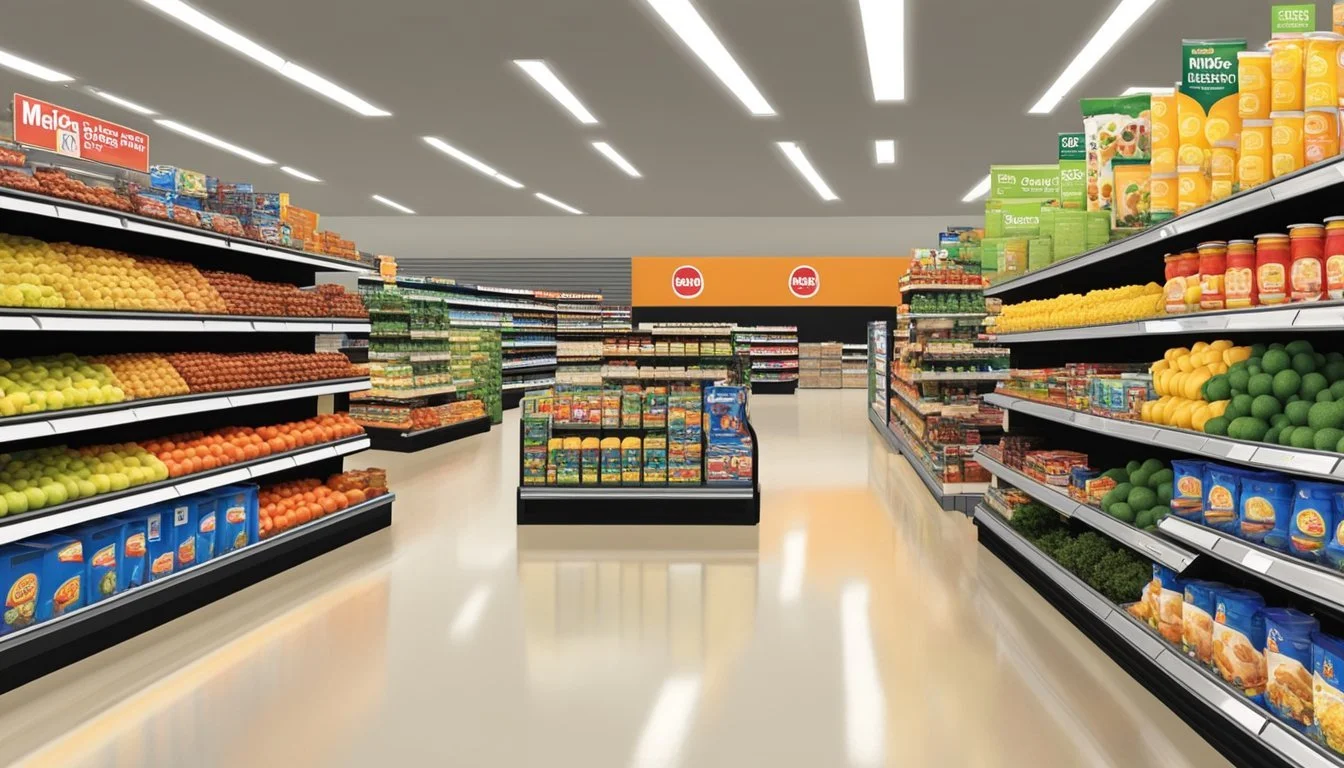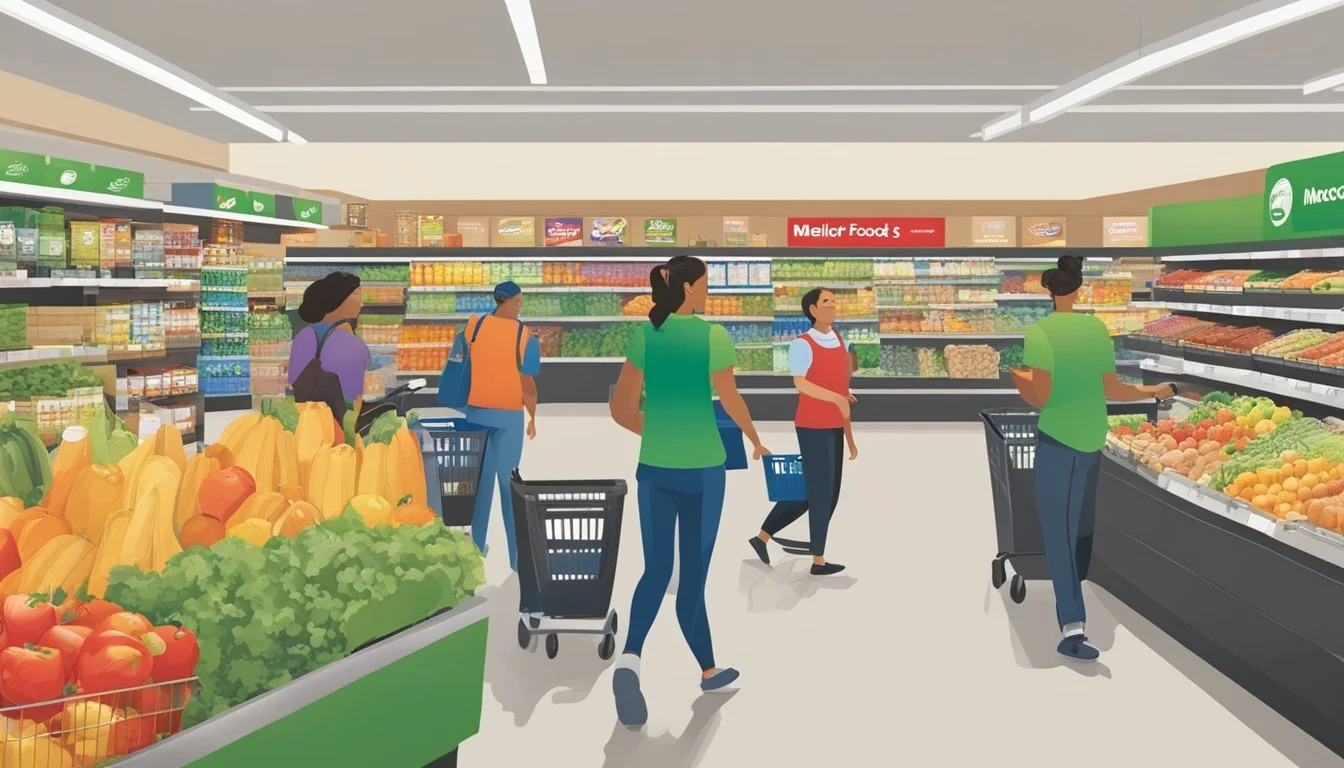Meijer vs WinCo Foods
A Comprehensive Comparison of Prices, Quality, and Service
When it comes to grocery shopping, finding the best value for your money is essential. Meijer and WinCo Foods are two popular grocery store chains that offer competitive prices and a wide selection of products. Both stores have their strengths and appeal to different types of shoppers.
WinCo Foods generally offers lower prices than Meijer, making it an excellent choice for budget-conscious consumers. WinCo's no-frills approach, including a bag-your-own-groceries policy and limited brand options, allows them to keep costs down. Meijer, on the other hand, provides a more traditional supermarket experience with a broader range of products and services.
Shoppers looking for convenience and a one-stop shopping experience may prefer Meijer. The store offers departments like pharmacy, electronics, and clothing in addition to groceries. WinCo Foods focuses primarily on groceries and household essentials, which contributes to its ability to maintain lower prices overall.
Company Profiles
Meijer and WinCo Foods are two prominent supermarket chains in the United States, each with its own unique history and approach to serving customers. Both companies have grown from humble beginnings to become major players in the grocery retail industry.
History of Meijer
Meijer was founded in 1934 by Hendrik Meijer in Greenville, Michigan. The company started as a small grocery store during the Great Depression.
In 1962, Meijer pioneered the supercenter concept, combining grocery and department store offerings under one roof. This innovative approach set the stage for future growth.
Meijer expanded steadily throughout Michigan in the following decades. The company later entered other Midwest states, including Ohio, Indiana, Illinois, Kentucky, and Wisconsin.
Today, Meijer operates over 250 supercenters and grocery stores across the Midwest. The company remains family-owned and is known for its wide product selection and competitive pricing.
History of WinCo Foods
WinCo Foods traces its roots back to 1967 when Ralph Ward and Bud Williams opened a discount warehouse grocery store in Boise, Idaho. The company was originally named Waremart.
In 1999, Waremart changed its name to WinCo Foods, an acronym for Winning Company. This rebranding coincided with the company's employee stock ownership program launch.
WinCo Foods has grown steadily, expanding beyond Idaho into other western states. The company is known for its no-frills approach and low prices.
As of 2024, WinCo Foods operates over 130 stores across nine states, primarily in the western United States. The company remains employee-owned and focuses on providing quality products at competitive prices.
Store Layout and Shopping Experience
Meijer and WinCo Foods offer distinct shopping environments tailored to their target customers. The layout and organization of each store impact the overall experience for shoppers.
Navigating Meijer Aisles
Meijer stores feature a spacious layout with wide aisles and clear signage. Products are organized into departments, making it easy for customers to find what they need. The grocery section is typically located at one end, with household goods, clothing, and electronics spread throughout the store.
Meijer's layout encourages browsing, with eye-catching displays and promotional areas scattered throughout. Fresh produce is often prominently displayed near the entrance. The bakery, deli, and prepared foods sections are usually clustered together, creating a convenient one-stop area for quick meal solutions.
Checkout options at Meijer include traditional lanes and self-service kiosks. During peak hours, the store may open additional registers to reduce wait times.
Shopping at WinCo Foods
WinCo Foods embraces a no-frills warehouse-style layout. The store design prioritizes efficiency and cost-saving measures. Aisles are typically wider to accommodate pallets and bulk displays.
Products at WinCo are often displayed in their original shipping boxes or on industrial shelving. This approach reduces labor costs and allows for lower prices. The bulk foods section is a standout feature, offering a wide variety of items that customers can purchase in custom quantities.
WinCo's layout is designed for a straightforward shopping experience. Essentials like dairy and produce are usually located around the store's perimeter. The center aisles house packaged goods, organized by category.
Checkout at WinCo is notable for its bag-your-own approach. Customers pack their groceries, which contributes to the store's cost-saving model.
Product Range and Quality
Meijer and WinCo Foods offer diverse product selections to cater to different customer needs. Both stores stock a wide range of groceries, though their focus and specialties differ.
Meijer's Product Selection
Meijer boasts an extensive product range that goes beyond typical grocery items. The store carries fresh produce, meats, dairy, and baked goods. Meijer also offers a variety of organic options across different departments.
Their produce section features both conventional and organic fruits and vegetables. The meat department provides various cuts and types, including grass-fed and free-range options.
Meijer's bakery produces fresh bread and pastries daily. The store also carries a selection of specialty and gourmet items, catering to diverse dietary needs and preferences.
WinCo Foods' Product Variety
WinCo Foods focuses on providing a wide range of products at competitive prices. The store offers an impressive bulk foods section, allowing customers to purchase items in custom quantities.
WinCo's produce department stocks fresh fruits and vegetables, with some organic options available. Their meat section includes standard cuts and ground meats.
The store carries a variety of dairy products and baked goods. WinCo's selection tends to prioritize popular brands and everyday staples over specialty or gourmet items.
WinCo's emphasis on bulk foods sets it apart, offering customers the ability to buy grains, nuts, spices, and snacks in desired amounts.
Pricing and Savings
Both Meijer and WinCo Foods aim to provide value to customers through competitive pricing strategies. Each retailer employs different methods to keep costs down and pass savings on to shoppers.
Meijer's Pricing Strategy
Meijer offers everyday low prices on many items throughout its stores. The retailer frequently runs sales and promotions to attract budget-conscious shoppers. Meijer's mPerks digital coupon program allows customers to clip coupons and earn rewards on purchases.
The company leverages its large scale to negotiate competitive prices from suppliers. Meijer also produces many of its own store brand products, which are typically priced 10-30% lower than national brands.
Loss leaders and weekly specials help draw customers into stores. Meijer often prices staple items like milk, eggs, and bread competitively to build price perception.
WinCo Foods' Low-Price Model
WinCo Foods operates on an extremely lean business model to offer rock-bottom prices. The employee-owned company cuts costs by having customers bag their own groceries and not accepting credit cards.
WinCo focuses heavily on store brands and bulk bin items to keep prices low. Many WinCo private label products are 20-40% cheaper than national brand equivalents. The retailer's no-frills stores and limited advertising also contribute to savings.
Price checks show WinCo's overall prices are often 15% below traditional supermarkets. The company's buying power allows it to negotiate aggressively with suppliers. WinCo's "Wall of Values" features rotating deals on popular items to drive traffic.
Brand and Private Label Options
Meijer and WinCo Foods offer a mix of national brands and private label products. Both retailers have developed their own exclusive store brands to provide value-oriented alternatives to name-brand items.
Meijer's Exclusive Brands
Meijer offers several private label lines across various product categories. Their main store brand is simply called "Meijer," covering everyday staples and groceries.
The retailer also has specialty private labels:
True Goodness: Organic and natural products
Purple Cow: Ice cream and frozen treats
Frederik's by Meijer: Premium foods
Meijer's store brands typically provide 20-30% savings compared to national brands. The company focuses on quality, often partnering with established manufacturers to produce their private label items.
WinCo Foods' Private Labels
WinCo Foods emphasizes its private label offerings as a key part of its low-price strategy. The retailer's main store brand is "WinCo Foods," spanning most grocery categories.
Notable WinCo private label lines include:
Everyday Value: Budget-friendly basics
Western Family: Mid-tier grocery items
Shurfine: Canned goods and pantry staples
WinCo's store brands often undercut national brand prices by 30-40%. The company prioritizes cost savings, allowing customers to stretch their grocery budgets further.
Both Meijer and WinCo stock a wide range of national brands alongside their private labels, giving shoppers plenty of options at different price points.
Customer Service and Satisfaction
Meijer and WinCo Foods take different approaches to customer service, reflecting their unique business models and target demographics. Both aim to provide satisfactory shopping experiences, but their methods vary.
Meijer's Approach to Customer Service
Meijer emphasizes personalized service and customer engagement. The company trains employees to be attentive and helpful, often assisting shoppers in locating items or answering product questions. Meijer stores typically have staffed service desks for returns, exchanges, and general inquiries.
The retailer offers a loyalty program that provides personalized coupons and rewards. This system allows Meijer to tailor promotions to individual shopping habits, enhancing customer satisfaction.
Meijer also invests in technology to improve service. Self-checkout lanes and mobile apps for digital coupons and shopping lists are available in most locations.
Customer Experience at WinCo Foods
WinCo Foods focuses on a no-frills approach to keep prices low. This strategy impacts customer service delivery. The stores operate with minimal staff, which can result in longer checkout lines during peak hours.
WinCo emphasizes efficiency over personalized attention. Customers are expected to be more self-reliant when shopping, as fewer employees are available to provide assistance on the sales floor.
Despite the lean staffing model, WinCo maintains a reputation for cleanliness and organization in its stores. The company prioritizes keeping shelves well-stocked and prices clearly marked.
WinCo does not offer a loyalty program or digital coupons, staying true to its low-cost business model. This approach appeals to budget-conscious shoppers who prioritize consistently low prices over personalized promotions or services.
Specialty Services and Features
Meijer and WinCo Foods offer distinct specialty services to enhance the shopping experience. Both chains provide unique features that cater to different customer needs and preferences.
Meijer's Additional Services
Meijer stands out with its comprehensive range of services. The store offers a pharmacy department, complete with drive-thru options for convenient prescription pickup. Meijer's prepared foods section is extensive, featuring hot and cold deli items, rotisserie chickens, and made-to-order sandwiches.
The chain provides grocery delivery through partnerships with Instacart and Shipt. Customers can place orders online or via mobile apps for same-day delivery.
Meijer also operates gas stations at many locations, often with competitive fuel prices and rewards programs tied to in-store purchases.
Unique Offerings at WinCo Foods
WinCo Foods focuses on a no-frills approach but still offers unique features. The store is known for its extensive bulk foods section, where customers can purchase a wide variety of items in custom quantities.
WinCo's deli department provides fresh, made-to-order pizzas at competitive prices. The store also offers a selection of prepared foods, though typically more limited than Meijer's offerings.
Unlike Meijer, WinCo does not provide grocery delivery services. Instead, the chain emphasizes its low prices and encourages customers to shop in-store to maximize savings.
WinCo operates 24 hours a day at most locations, catering to customers with non-traditional schedules or late-night shopping needs.
Loyalty Programs and Discounts
Meijer and WinCo Foods offer different approaches to customer loyalty and savings. Meijer provides a free mPerks rewards program that allows shoppers to earn points on purchases and access digital coupons.
WinCo Foods, on the other hand, does not have a traditional loyalty program. Instead, they focus on offering consistently low prices across their stores without the need for membership cards or point systems.
Meijer's mPerks program enables customers to:
Earn rewards points on qualifying purchases
Access exclusive digital coupons
Receive personalized offers based on shopping habits
Redeem points for discounts on future purchases
WinCo's approach includes:
Everyday low prices without the need for a loyalty card
Bulk food sections for additional savings
Employee-owned business model that helps keep costs down
Both stores offer ways for families to save money on groceries. Meijer provides targeted discounts through mPerks, while WinCo maintains low prices across the board.
Shoppers looking for a points-based rewards system may prefer Meijer. Those who want straightforward low prices without tracking points or coupons might find WinCo's model more appealing.
Market Position and Competitor Comparison
Meijer and WinCo Foods occupy distinct positions in the grocery market, competing against both national chains and regional discount stores. Each retailer has unique strengths that appeal to different consumer segments.
Comparing Meijer to National Chains
Meijer competes with major national chains like Walmart, Target, and Kroger. The company operates 217 supercenters across the Midwest, offering a wide range of products beyond groceries. Meijer's pharmacies have become increasingly popular, expanding clinical services and providing free medication programs for certain prescriptions.
Compared to Walmart, Meijer often receives higher marks for customer service and product quality. However, Walmart typically maintains a slight edge in pricing. Target offers a more upscale shopping experience but carries fewer grocery items than Meijer.
WinCo Foods Against Other Discount Grocers
WinCo Foods positions itself as a low-price leader among grocery retailers. It competes directly with discount chains like Grocery Outlet and Aldi. WinCo's prices are typically 12-30% below average, potentially saving families over $2,800 annually on groceries.
Unlike some discount stores, WinCo maintains a consistent inventory of both national brands and private label products. This gives it an advantage over Grocery Outlet, which offers a rotating selection of discounted surplus items.
WinCo's employee-owned structure allows it to keep costs low, often undercutting prices at Safeway, Albertsons, and even Walmart. However, its no-frills approach means fewer amenities than some competitors offer.
Community and Environmental Initiatives
Meijer and WinCo Foods both engage in community and environmental initiatives, though their approaches differ. Meijer has set ambitious sustainability goals, aiming to divert 70% of company waste from landfills by 2025. In 2022, they made significant progress, estimating a 66% diversion rate.
Meijer participates in the Beyond the Bag initiative, working to reduce plastic bag usage. Their loyalty app includes a feature reminding customers to bring reusable bags when approaching stores.
WinCo Foods, as an employee-owned company, focuses on community involvement through its ownership structure. This model allows employees to have a stake in the business and its local impact.
Both stores offer organic produce options, catering to health-conscious consumers. However, the extent of their organic selections may vary by location.
Meijer operates as a family-owned business, which can influence its community-oriented decisions. WinCo's employee ownership similarly fosters a sense of local investment.
Neither company has publicized extensive information about specific local grocery partnerships or community programs. More research may be needed to fully compare their local engagement efforts.
Online Shopping and Delivery Services
Meijer and WinCo Foods offer different online shopping and delivery options to meet customer needs. Their services vary in availability, pricing, and features.
Exploring Online Options at Meijer
Meijer provides a robust online shopping experience through its website and mobile app. Customers can browse products, create shopping lists, and place orders for pickup or delivery. Meijer offers same-day delivery through Shipt, a third-party service.
Meijer's delivery fees start at $3.99 for non-members. A Shipt membership costs $99 per year or $9.99 per month, offering free delivery on orders over $35. This pricing structure is competitive with other major grocery delivery services.
The retailer's click-and-collect service allows customers to order online and pick up their groceries curbside. This option is free for orders over $35.
WinCo Foods' Online and Delivery Capabilities
WinCo Foods has a more limited online presence compared to Meijer. The company does not offer direct delivery services or a comprehensive online shopping platform. Instead, WinCo focuses on in-store shopping experiences.
Some WinCo locations partner with third-party delivery services like Instacart in select areas. These partnerships allow customers to order WinCo products through the Instacart app or website. Availability and pricing may vary by location.
WinCo's website provides basic information about store locations, weekly ads, and product availability. However, it lacks the full online shopping capabilities found on Meijer's platform.
Consumer Research and Surveys
Consumer Reports conducts extensive surveys to evaluate grocery stores across the United States. Their 2018 Supermarkets Survey gathered responses from over 75,000 members, providing valuable insights into customer experiences.
Meijer and WinCo Foods both performed well in various consumer research studies. These stores consistently ranked among the top options for low prices, often offering 12-30% savings compared to average grocery prices.
Researchers at Consumerpedia analyze pricing data and customer feedback to rate supermarkets. Their findings highlight the competitive pricing strategies of both Meijer and WinCo Foods.
Consumer surveys often evaluate factors such as:
Price competitiveness
Product quality
Customer service
Store cleanliness
Checkout speed
WinCo Foods ranked 7th in a recent study of the best grocery chains in the U.S., with a score of 4.464 out of 5. This indicates high levels of customer satisfaction across multiple criteria.
While specific rankings for Meijer were not provided in the search results, its consistent mention alongside other top-performing stores suggests positive consumer sentiment.
Podcasts and online forums frequently discuss grocery store comparisons, with many shoppers praising both Meijer and WinCo Foods for their affordability and selection.
Conclusion
Meijer and WinCo Foods both offer competitive options for grocery shoppers. WinCo Foods stands out for its consistently low prices, often 12-30% below average. This can lead to significant savings for families over time.
Meijer provides a broader shopping experience with its supercenter format. It offers a wider range of products beyond groceries, which may be convenient for some customers.
WinCo's employee-owned model contributes to its ability to keep prices low. The store focuses on no-frills presentation and bulk buying options to pass savings to customers.
Meijer tends to have more locations in certain regions, potentially offering greater accessibility. Its stores also typically feature pharmacies and expanded departments.
Both chains prioritize value, but shoppers may need to weigh factors like product selection, store atmosphere, and location when choosing between them. Personal preferences and shopping habits will ultimately determine which store better suits individual needs.











